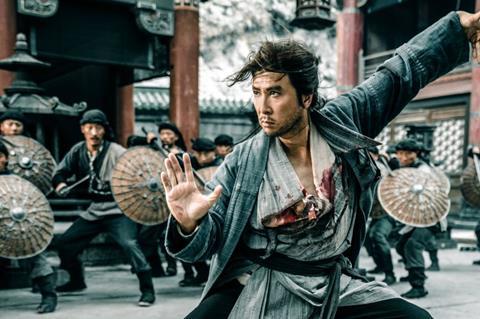Tokyo: Donnie Yen on Stepping Behind the Camera for His Martial Arts Passion Project ĎŚakraí
The action hero is producing, directing and starring in the film, an adaptation of the classic Chinese novel 'Demi-Gods and Semi-Devils': "I really think this has been one of the biggest challenges of my career."
BY PATRICK BRZESKI
OCTOBER 24, 2022 3:45PM

Behind the scenes on Donnie Yen's 'Śakra' COURTESY OF WISHART
Donnie Yen is among the exceedingly few actors of his generation to have worked at the highest levels of both Hollywood and the Chinese film industry. These days, though, he says heís putting all his focus in the singular project of elevating Chinese commercial cinemaís reputation on the world stage.
Yen made his breakthrough way back in 1992 in Tsui Harkís Wuxia classic Once Upon a Time in China II thanks to a memorable fight scene against the filmís hero, played by Jet Li. Scores of roles in Hong Kong, Chinese and Hollywood cinema have followed, including parts in Zhang Yimouís Hero, Wilson Yipís brutal crime flicks SPL: Sha Po Lang and Flash Point, Chinese tentpoles like The Monkey King 3D and Raging Fire, and most memorably as the star of the semi-biographical Ip Man movie series, which tells the story of Bruce Leeís legendary teacher of Wing Chun. While his Chinese film career continued at a blistering pace, Yen went on to co-star in The Weinstein Companyís martial arts sequel, Crouching Tiger, Hidden Dragon: Sword of Destiny (2016) and Disney tentpoles including Rogue One: A Star Wars Story (2016) and Mulan (2020).
Presently, Yen is producing, directing and starring in the Chinese tentpole Śakra, an adaptation of Demi-Gods and Semi-Devils, a classic wuxia novel from 1963 that is considered one of the most influential works of martial arts fiction ever. The film began production this summer, with Yen starring as martial arts master Qiao Feng, one of the central figures of the Demi-Gods and Semi-Devils story universe. The actor envisions Śakra ó which he alternately describes as both Chinaís Shakespeare and Marvel ó as a potential franchise starter, with the bookís many sub-plots and compelling characters ripe for further big-screen adaptation. The film is produced by Chinese studio Wishart, with Yenís longtime collaborator Wong Jing (From Vegas to Macau) also attached as a producer. International sales on Śakra are being handled by Plus Entertainment Limited, with the title already generating interest at both the Tokyo International Film Festivalís TIFFCOM market this week, and the upcoming American Film Market in Los Angeles.
The Hollywood Reporter spoke with Yen about why Śakra is a personal passion project and how it fits into his vision for the future of the Chinese film industry.
How did your involvement in Śakra come about?
Well, as you know, Iíve been in the industry for many, many years, right? I think for any artist or actor whoís done so many films, whether they were successful or not, itís really important to keep finding motivation and inspiration. That motivation comes from a feeling ó itís about what kind of film you want to make, and the energy and creativity follows that feeling.
So, when I consider a project, there are three action genres in my book. One is the contemporarily action movie, like my films Raging Fire, Kill Zone or Flash Point. The second type is the kung fu movie, like my Ip Man franchise, where the era is closer to the modern day, but people donít fly as much (laughs). It requires a more traditional martial arts form ó like Ip Man or The Grandmaster, where you see traditional martial arts abilities in a character who is grounded in realism. Like the old Shaw Brothers movies, and so many that Jackie Chan and Jet Li did. And the third type is the Wuxia movie, which is a whole other rich tradition of stylistic heritage. Itís been a long time since I did a Wuxia movie. I did Crouching Tiger 2 and Mulan, but I wouldnít really consider either of those a true Wuxia movie. Mulan really wasnít my cup of tea, but I did it for my kids, who grew up watching the original animation. The last film I did, which I would consider truly in the genre, was probably Hero (2002). So itís been a long time. And I think after I finished the Ip Man series, I didnít feel that I would be able to continue to find fresh inspiration to make kung fu movies. So thatís why I returned to make more contemporary action movies, and thatís what I did with my late friend Benny Chan on Raging Fire (2021). So then I got this opportunity to make a Wuxia film and I hadnít done one in a while and I felt it had the chance to really be something special. The older I get, the more I feel that if I commit to a project, it has to at least have the chance of being a really special film ó something that can leave a mark and have a legacy. I feel like we achieved that with Ip Man; Iím really proud of those films. And I felt that maybe we could do something big and special in the Wuxia genre with this one.




 Reply With Quote
Reply With Quote




